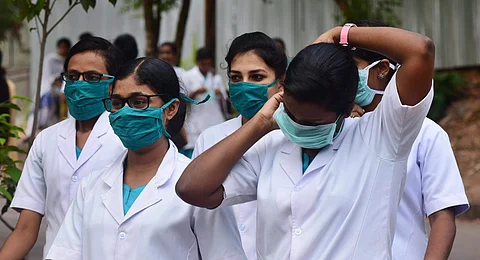

Two years ago, the WHO chose 2020 as the Year of the Nurse, because it marks the birth bicentenary of Florence Nightingale, the globally celebrated figure associated with nursing. Her birthday (May 12) is observed every year as the World Nursing Day. But for the COVID-19 epidemic, these would have drawn attention to the critical importance of the nursing profession in ensuring a strong health system response to the varied health needs of the population. Ironic, since nurses are of even higher value to societies challenged by public health emergencies such as COVID-19.
Globally, the role of the nursing profession has been redefined over the years but varies widely across countries. The nursing profession, like the medical profession, has different sub-components performing different roles. They range from auxiliary nurse midwives and public health nurses who perform many public health functions to several categories of basic and specialised clinical nursing. There are midwives who specialise in obstetric care at child birth. Across the continuum of life, from birth to death, a nurse is the constant figure who provides compassionate care. A surgeon feels helpless without a competent operation theatre nurse and an intensive care unit will collapse without skilled nurses.
Despite this, nursing has not received the respect and support it deserves in many nations like India. Our aggregate national numbers are low, with respect to nurse to population ratio and nurse to doctor ratio. Salaries are low and the respect accorded to them, in hospitals or the community, falls far short of the dedicated service they provide. Nurses are not entitled to managerial positions in health systems; their teaching role is not adequately recognised. Medical interns learn many skills, from giving injections to dressing a wound from the ward nurse. Yet, we have doctors formally teaching nursing students in classrooms but never the other way around.
Nursing education needs reform. More than half of nursing colleges are in the southern states. Other regions too need to invest, with the new nursing colleges attached to district hospitals. Competency- based curriculum must be devised, with emphasis on practical skills. The strange separation of nursing college faculty from clinical responsibilities in hospitals must end. Wherever possible, nursing, medical and allied health professional training must be co-located to promote inter-professional learning and team-based training.
Midwifery must be promoted as a specialised discipline, without subsuming it under general nursing. Nurse Practitioner training programmes must be scaled up. Specialist nurse training programmes must be strengthened, as many areas from critical care to cardiac surgery need specific skills and knowledge-based training. Nurse anaesthetists, nurse radiographers and nurse obstetricians are now active in some countries. Mental health, geriatric nursing and palliative care will be important areas for future growth of nursing. Gender balance needs to be promoted in nursing education—we need male nurses too!
Nurses at the front lines must be given formal public health training and become technology-enabled. Chronic continuous care of diabetes, hypertension and coronary heart disease is eminently feasible in primary care settings, through the medium of technology-enabled nurses, as well demonstrated in many countries including India.
Administrative and managerial positions should also open up for mid-career nurses. Sponsored education in public health-related degree and diploma programmes would prepare them for managing public health programmes at block and district level, with further opportunities ahead for state or national level leadership in policy and programme development, implementation and evaluation. Similarly, formal education in hospital management will open pathways for playing a leadership role in hospital administration. Human resource management too needs special training, as well-defined nursing cadres emerge and demand efficient and empathetic management.
Lest it be forgotten, Florence Nightingale was a highly respected statistician, apart from being an inspirational leader of the nursing profession. She published statistical analyses of mortality data from the Crimean war. Her ‘coxcomb’ and ‘bat’s wing’ diagrams, plotting data from the front lines, educated the public and shook the British army brass. She even laid the ground for future development of statistics faculty at Oxford. Nurses in India too have to be trained and supported to design and conduct research, whether in clinical or public health settings. In many high income countries, well-trained nurses are actively engaged in research, not only as clinical trial managers but also as lead investigators in important projects. They win research grants and publish in prestigious scientific journals. It is time for the experiential wisdom and intellectual curiosity of nurses to traverse the path of productive research.
In the Year of the Nurse, let us acknowledge the silent but stellar role played by nurses even in standing up to COVID-19. Endless work hours away from families, sometimes braving stigma from neighbours and strangers, have not given them the public appreciation they deserve. As we rebuild our health systems, let us ensure that the nursing profession attains the scale, skills, salaries and social status that will translate into greater strength and success of our health system.
Dr K Srinath Reddy, President, Public Health Foundation of India. Views are personal(ksrinath.reddy@phfi.org)